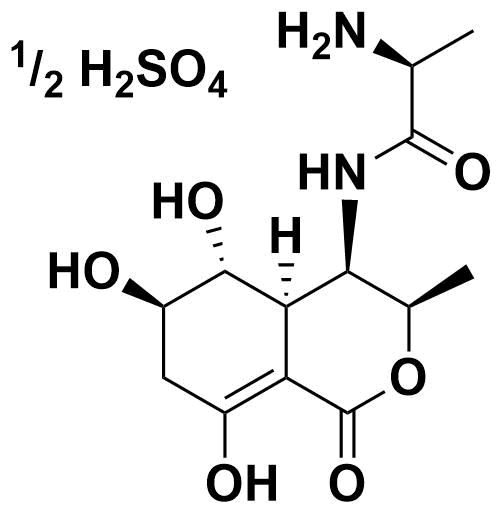HOME> Products> Natural and Chemical compound> Other natural compound> Actinobolin (Sulfate) [CAS: 18802-17-0]
Bioactive compound to inhibit protein synthesis Actinobolin (Sulfate) [CAS: 18802-17-0]
Date:June 24 2025Web Page No:520087
Actinobolin is a bioactive compound harboring antibiotic activity, which was isolated from Streptomyces.1)
Actinobolin is able to inhibit protein synthesis in both bacteria2) and mammalian cells.3, 4)
It was also reported that this compound expressed inhibitory activity to bacteria associated with periodontal diseases5) and immunosuppression.6)
It is also known that Bactobolin which was isolated from Psendonionas has a similar structure of actinobolin.
* This product is for research use only.

Structure of Actinobolin (sulfate) (#15172)
Specification
| CAS# | 18802-17-0 |
|---|---|
| Molecular Formula | C13H20N2O6・1/2H2SO4 |
| Molecular Weight | 349.347 |
| Purity | >98% (HPLC) |
| Solubility | Soluble in H2O, MeOH, and DMSO |
Application note
- Actinobolin inhibited protein synthesis in Escherichia coli, which the inhibitory mechanism was different of other inhibitors such as chloramphenicol and sparsomycin.2)
- Actinobolin inhibited synthesis of both DNA and protein in mouse adenocarcinoma 755 cells, both in vivo and in cell culture. It was suggested that the compound could compete aminoacyl-tRNA to inhibit protein synthesis.3)
- Actinobolin expressed inhibitory activity to bacteria associated with periodontal diseases such as Bacteroides melaninogenicus, Fusobacterium fusiforme, Leptotrichia buccalis, and Veillonella parvula.5)
- This compound expressed immunosuppressing activity to experimental autoimmune myasthenia gravis (EAMG).6)
- As shown at the table below, the compound had inhibitory activity to protein synthesis in E. coli and mammalian cells.4)
■ Inhibitory activity of actinobolin against protein synthesis from Reference #4
| Biological activity | Activity value | |
|---|---|---|
| E. coli | Reported MIC (Minimum Inhibitory Concentration) | 1.7×10-4 M |
| Inhibition of protein synthesis (ID50) | 3×10-5 M | |
| Mouse L1210 cell line | Inhibition of cell growth (ID50) | 1.2×10-4 M |
| Inhibition of protein synthesis (ID50) | 4×10-4 M | |
| Rabbit reticulocytes (Cell free) | Inhibition of hemoglobin synthesis (ID50) | 1×10-3 M |
Reference
- Haskell, T.H., et al., US Patent, 3043830 (1962).
- Hunt, D.E., et al., Can. J. Microbiol., 12 (3), 515~520 (1966). [PMID:5336183]
- Smithers, D., et al., Mol. Pharmacol., 5 (5), 433~445 (1969). [PMID:5823760]
- Hori, M., et al., J. Antibiotics, 34 (4), 465~468 (1981). [PMID:7196909]
- Armstrong, P.J. Jr. and Hunt, D.E., Appl. Microbiol., 23 (1), 88~90 (1972). [PMID:5059624]
- Ishigaki, Y., et al., J. Neurol. Sci., 112 (1-2), 209~215 (1992). [PMID:1469434]

[Date : March 03 2026 00:09]
| Detail | Product Name | Product Code | Supplier | Size | Price | ||||||||||||||||||||||||||||||
|---|---|---|---|---|---|---|---|---|---|---|---|---|---|---|---|---|---|---|---|---|---|---|---|---|---|---|---|---|---|---|---|---|---|---|---|
|
Actinobolin (sulfate) <Protein and DNA Synthesis Inhibitor> DatasheetThis may not be the latest data sheet. |
15172 | IMCInstitute of Microbial Chemistry | 1 mg | $500 | |||||||||||||||||||||||||||||||
|
|
|
||||||||||||||||||||||||||||||||||
[Date : March 03 2026 00:09]
Actinobolin (sulfate) <Protein and DNA Synthesis Inhibitor>
DatasheetThis may not be the latest data sheet.
- Product Code: 15172
- Supplier: IMC
- Size: 1mg
- Price: $500
| Description |
M.W.: 349.347 Purity : >98% (HPLC) Molecular Formula : C13H20N2O6・1/2H2SO4 Solubility : Soluble in H2O, DMSO, and MeOH Actinobolin is a biological compound harboring antibacterial activity. It was reported that the compound inhibited protein synthesis in bacteria and mammalian cells. |
||
|---|---|---|---|
| Storage | -20°C | CAS | 18802-17-0 |
| Link |
|
||
CONTACT
export@funakoshi.co.jp
- ※Prices on our website are for your reference only. Please inquire your distributor for your prices.
- ※Please note that Product Information or Price may change without notice.
